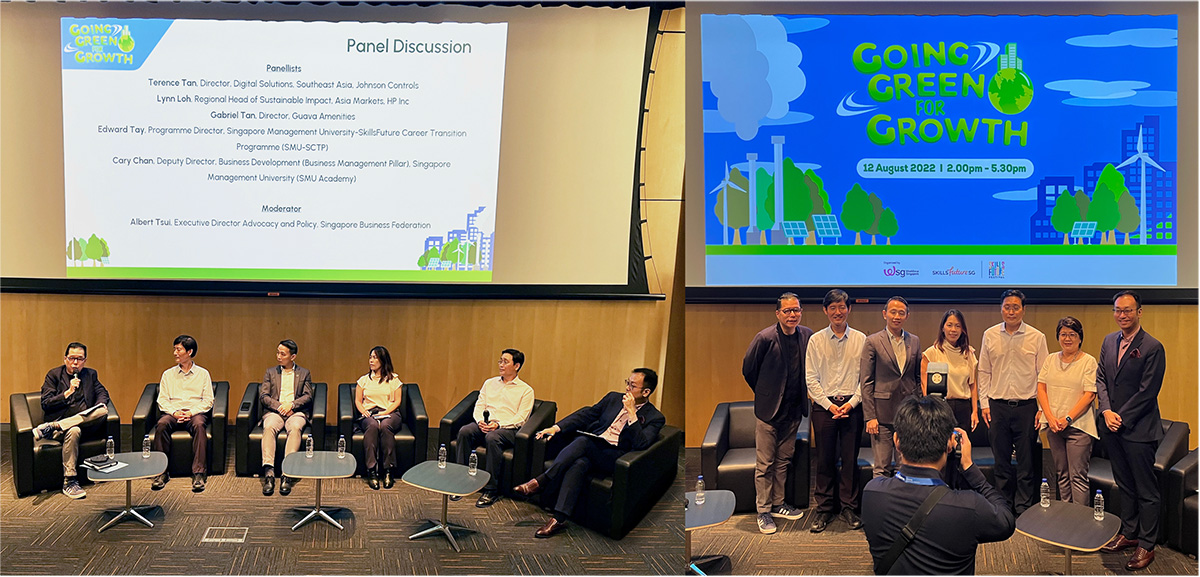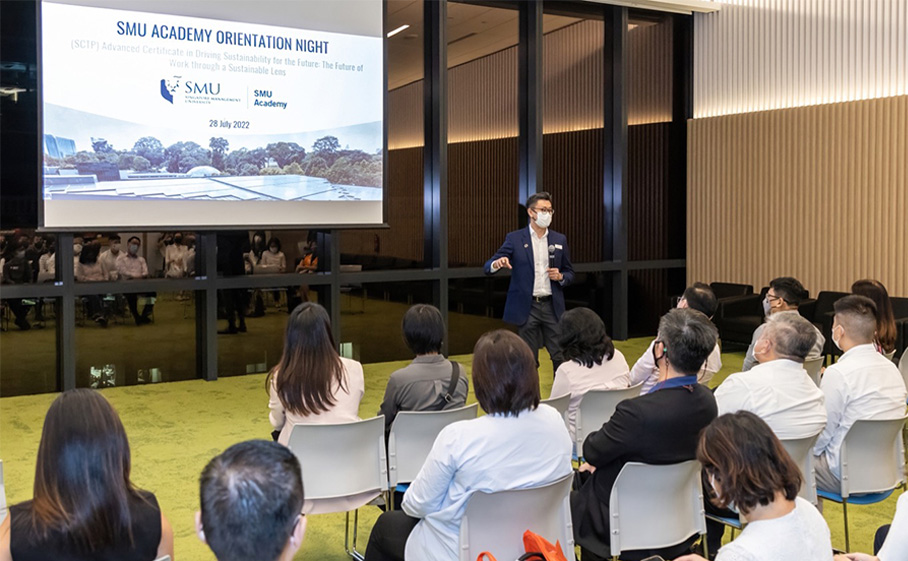
As part of the SkillsFuture Festival 2022, SkillsFuture Singapore and Workforce Singapore co-hosted an event comprising keynote speeches, a panel discussion and a networking session for enterprises who are keen to kickstart their sustainability journey. The panel discussion consisting of industry experts and sustainability practitioners shared their insights on effectively transforming organisations under the Green Economy as well as exchanged perspectives on the challenges and opportunities for individuals and enterprises.
Panellists included Director of Digital Solutions at Johnson Controls, Mr Terence Tan, Regional Head of Sustainable Impact at HP, Ms Lynn Loh, Director at Guava Amenities, Mr Gabriel Tan, CEO of Sistema Asia Capital and Programme Director of SMU Academy’s SkillsFuture Career Transition Programme on sustainability, Mr Edward Tay, and Deputy Director at SMU Academy, Mr Cary Chan.
Read on to find out our 5 key takeaways from the Going Green for Growth discussion:

1. Create value through meaningful partnerships
While businesses are increasingly expected to do more to move the needle towards sustainable development, action by businesses are not enough to drive systemic changes as these issues often transcend beyond the capabilities of individual companies or an industry alone. According to McKinsey, one of the best approaches for businesses in such cases would be to form partnerships and collaborations.
“We have a suite of technology that would enable that to help the client investigate the different technology building systems and how to mitigate it. We have got the processes to be able to drive towards a net-zero, looking into not just the technology part of the equation, but also from a financial, partnership, and renewable energy perspective as well. We see this as a huge opportunity not just for Johnson Controls, but also to partner with the real estate industry to drive towards the net zero economy by 2050. We are quite excited with our positioning of how we can value-add to the industry from our built environment perspective.” – Terence Tan, Johnson Controls
“What we do is we believe in doing things differently, and we believe in sustainability beyond the environment. So for us, when we look at sustainability as something that we want to do, beyond the environmental part of it, we also seriously consider the social impact. Social impact means all the relevant people that are involved, including our internal stakeholders, our staff, our employees, as well as the partners that we have in our entire ecosystem. […] As we work with clients, it could be reducing waste, it could be reducing the distance between manufacturers to customer locations, it could be reducing carbon emission, our employees have a stronger sense of purpose in terms of what we do together as an organisation. It is not just about the job, but it’s about we as an organisation, we are doing something meaningful together, in partnership with our customers. And this is something that they are proud of.” – Gabriel Tan, Guava Amenities
“Honestly, sustainability is so big, nobody’s an expert, right? Some of us can be experts in one area, but nobody can claim ownership of all of them. So just working with qualified education institutions such as SMU and coming up with curated programmes such as the SkillsFuture Career Transition Programme (SCTP), is a blessing in my opinion.” – Edward Tay, Sistema Asia Capital and SMU-SCTP.
“My goal is to curate programmes that are for people like yourself. And by all means, these are not academic programmes. SMU in its DNA has never been solely academic because we roll out programmes that are application-oriented. So, what are some of the kinds of strategic partnerships we have? We work with people like him (Edward), and with different companies. So, the SCTP has three components. You have got the knowledge component. Secondly, we conduct corporate visits. You might ask why would you visit companies? There are a lot of things to learn. You’ve heard from Johnson’s, you’ve heard from HP, right? And you learn from Guava, SMEs, and MNCs. But these are not merely visits. You talk to chief corporate officers over there. You come back to SMU, we dissect, we debrief. We talk about what you have learnt, and we bring it back systematically to one of the topics or areas of domains that you have learned during a programme. And as a culminating factor, we have the Career Mentorship and a project mentorship as well. They (project mentors) bring to the table, a wealth of experience that they can share so that you can solve a real-life project for an actual company.” - Cary Chan, SMU Academy

2. Sustainability will be increasingly important for SMEs
Regulatory authorities have announced mandatory sustainability disclosure for financial institutions and listed companies in Singapore. In its latest sustainability report, the Monetary Authority of Singapore (MAS) set out its strategy on climate resilience and environmental sustainability, highlighting its expectation on high quality sustainability disclosure as these become mandatory for financial institutions and listed companies in Singapore over the next couple of years. The mandatory sustainability disclosure requirements carries significant implications for small and medium enterprises (SMEs) across the supply chain. As multinational corporations face increased consumer, regulatory and investor pressures to report on their climate-related disclosures, these pressures will further cascade down to SME service and goods provider in the supply chain.
On the impact of the mandatory sustainability reporting on SMEs:
“Last week MAS managing director Ravi Menon made a big announcement for the future, and how all the listed companies here in Singapore will have to make disclosures of sustainability. Not only just reports, but sustainability reporting has also been in place since 2017. But it will be made mandatory right now. What it means is that for a lot of SMEs out there when you're dealing with listed companies here in Singapore, or in the region especially those in Europe and the US, you will have to take care of their sustainability considerations, right? If you're going to be building a project for them, you need to know what ESG is.” – Edward Tay, Sistema Asia Capital and SMU-SCTP Programme Director.

3. Businesses and individuals must leverage opportunities to upskill
Green skills are a critical part in accomplishing the green transition successfully and effectively. They are the building blocks and a key enabler to unlocking the human capital to power that transition. Given Singapore’s Green agenda and the greening of current jobs, different business functions from marketing, to communications, finance and operations will need to acquire green skills and new knowledge as business practices become more sustainable. To capture economic opportunities and to remain competitive, there is a need to act quickly and early, and to build the right skills to support the green demand.
“The value proposition that one could bring is that you always keep abreast of the latest developments, trends and practical knowledge. The learning culture never stops, right? So, in terms of SkillsFuture, in terms of IBF, I think SkillsFuture is a very, very good initiative taken by the government so that they can reskill yourself, and I encourage everybody and all organisations to leverage it.” – Cary Chan, SMU Academy
“I think there are other job categories that will face significant changes in the coming years on this green journey. First, I would say is supply chain professionals. If your company is building some form of products, if you are manufacturing and selling something, it's very likely that your largest carbon footprint comes from the manufacturing and supply chain. So, supply chain professionals need to upskill themselves, to understand where to look at for such as carbon improvements, where are the carbon reduction opportunities and then deploy more responsible practices. It is no longer just building the cheapest thing at the fastest speed and getting them to your customers the earliest.” - Lynn Loh, HP Inc

4. Importance of agility and adaptability to boost employee’s value proposition
With the notion of work changing drastically, it is now imperative for both employees and companies to embrace work that has been redefined in unconventional ways. Agility and adaptability are now lauded as essential skills one must hold to stay afloat in this fast-evolving landscape.
“I think something that we all can agree that is happening right now, is after the pandemic, things are getting more and more unpredictable. There are more volatilities, there are more uncertainties than before. […] So, I think the kind of skill sets that you need to have in this day and age is about the agility and the ability to adapt very quickly.” - Gabriel Tan, Guava Amenities

5. Empower your Chief Sustainability Officer
With net-zero deadlines on the horizon, companies have been expanding their sustainability teams and appointing chief sustainability officers at a brisk pace in recent years. Today’s CSO must be able to supercharge the sustainability transformation, balancing innovation, risk mitigation, sustainability, and business challenges as they deal with new and dynamic expectations. The ESG transformation puts CSOs at the heart of introducing change in organisations. For a CSO to be truly effective, they need to be empowered and receive strong leadership support.
“10 years ago, when somebody asked me what my job is, it was a very niche field. I can hardly find another colleague from another company that does what I do. So, in that sense, there are hardly any Chief Sustainability Officers around. Today, that number is growing, thankfully, but recent research that I looked up says that only 14% of these CSOs are active. Out of all the companies surveyed, half of the companies had CSOs that were two or more levels down from the C-suite level, meaning they will not have the ability to influence and shape that sustainability transformation in their company. And out of the companies surveyed, 33% do not even have a CSO. So, if you ask me what kind of jobs should be out there today, if your company does not yet have a CSO, please hire one. Secondly, empower that CSO.” – Lynn Loh, HP Inc.
